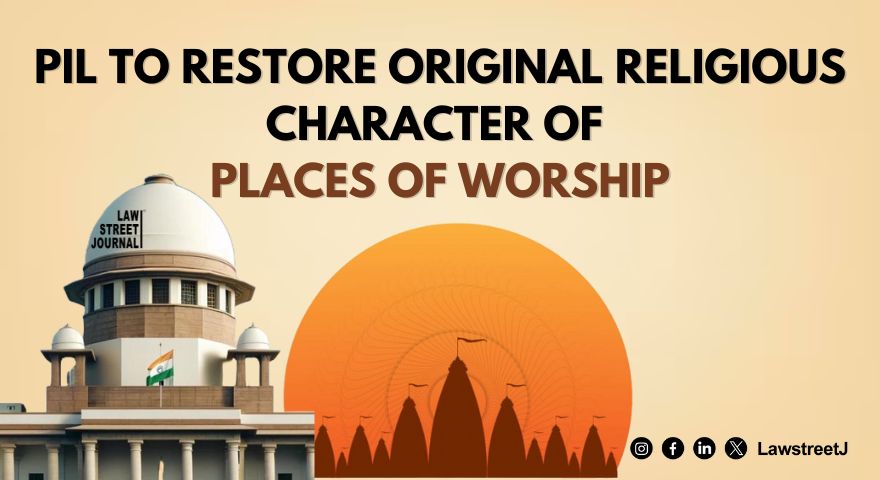New Delhi: A fresh plea has been filed in the Supreme Court by a law student challenging constitutional validity of the controversial Places of Worship Act, 1991, contending under the Hindu Law, the deity and its property is never lost and devotees have right to sue a wrongdoer for restoration of deity and its property.
Delhi University's LLB student Nitin Upadhyay asked the apex court to direct and declare that Section 4(2) of the Places of Worship Act 1991 is not only contrary to aims, objects and Preamble of the Act itself, but also manifestly arbitrary & violative of Articles 14, 21, 25, 26 of the Constitution.
He also sought a declaration that the Place of Worship Act prohibited conversion of original religious character of the places of worship’, not the ‘Structure/Edifice/ Construction/Building of the Places of Worship. The petitioner, son of eminent advocate Ashwini Kumar Upadhyay, who also filed a similar PIL, urged the court to declare that competent court can pass appropriate order to ascertain the original religious character of the places of worship.
Also Read: 'Should be limit to petitions challenging validity of 1991 Places of Worship Act,' SC defers hearing
The petitioner submitted that if a temple was destroyed back in 1200s, it cannot be said that the temples character was changed. A temples character can only be changed through certain rites, rituals and procedures. Therefore, the religious character of a temple, even though the structure may have been destroyed, would continue perpetually.
Therefore, the Act does not permanentize the apparently changed structure of the place of worship, rather it says that the original religious character has to be preserved, and that is impossible without survey of the Building/Structure/Edifice, the plea said.
The petitioner submitted that if the religious character has to be preserved, then the religious character of the place of worship has to be ascertained first. And, if the religious character has to be ascertained, then a scientific and documentary survey will have to be conducted. And, the Act, does not bar any type of survey, he contended.
The petitioner submitted that if character is of a temple but the apparent structure is of a Mosque or vice-versa, then only religious character is preserved by the Act. "And, to preserve the Character, the only rational course of action will be to make a structure resembling the character. If that is to be done, then the old structure will have to be modified. Therefore, the Act does not bar any Conversion of Structure/Edifice of a place of worship. Neither does it bar any survey. The Act only aims to protect the original religious character," it said.
Referring to Section 4 (2) of the 1991 Act, the bench said, this provision not only close the doors of mediation but also takes away the power of the judiciary.
"The legislature cannot take away the power of the judiciary to preside over disputes. This has been done through colourable legislation. If these matters are not fit to be in court, does the legislature have the power to decide so? Even to see whether the issue is fit to be raised in Court or not, it will have to go into the Court," he said, and added that power has been encroached upon by the legislature.
Also Read: Gyanvapi mosque committee seeks intervention in pleas against 1991 Act
This is a grave violation of separation of powers- a part of the basic structure.
The petitioner also submitted that the Centre neither can close the doors of Courts of First Instance and Appellate Courts nor take away the power of Apex Court and High Courts, conferred under Articles 32, 226 and 227.
He claimed Section 4(2) not only offend right to pray practice prorogate religion (Article 25), right to manage maintain administer places of worship-pilgrimage (Article 26), right to conserve culture (Article 29) but also contrary to States duty to protect historic places (Article 49) and preserve religious cultural heritage (Article 51A).
He also stated the Centre has transgressed its legislative power by barring remedy of judicial review which is basic feature of the Constitution.
The petitioner also asserted that the citizens have right to restore its past glory and nullify the signs of slavery and atrocities committed by invaders. Similarly, its duty of everyone to make every endeavour to get back past glory of nation thus Centre cannot enact law to legalize barbarian acts of invaders.
Also Read: Worship vs. Prayer: Constitutional Insights into the Places of Worship Act
His plea also said a mosque can be constructed only over Waqf property and no waqf can be created by any Muslim including Ruler, on the places of worship and pilgrimage of Hindus.
Hence, any mosque constructed over the land belonging to the deity or any property under the ownership of deity, cannot be a mosque in the eyes of Islamic law, thus having no legal sanction. Such mosques were constructed to trample the places of worship and pilgrimage of Hindus and to make them realize that they have been conquered. The status of mosque can be given only to such structures which have been constructed according to tenets of Islam and the mosques constructed against the provisions contained in Islamic law cannot be termed as mosque. Muslims cannot assert any right in respect of any piece of land claiming to be mosque unless the same has been constructed according to Islamic law, he said.
Though, the Supreme Court issued a notice in a similar writ petition against 1991 Act on March 12, 2021, the Centre has yet not filed its counter affidavit or reply.
The 1991 law prohibited the conversion of any place of worship and provides for the maintenance of the religious character of any place of worship as it existed on August 15, 1947.














